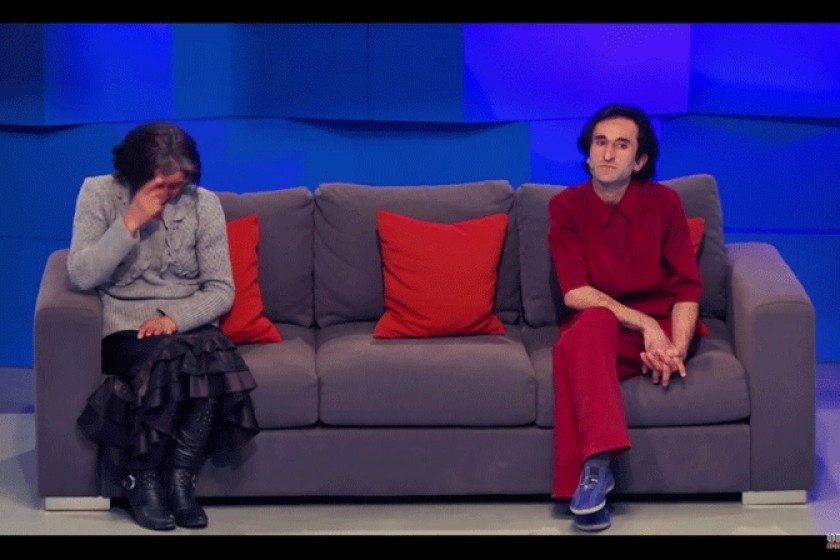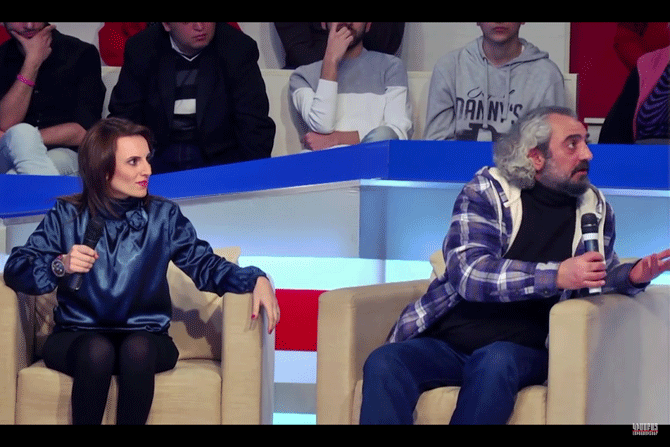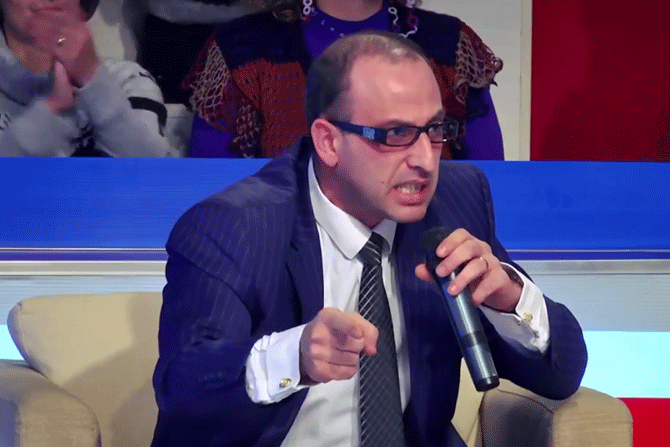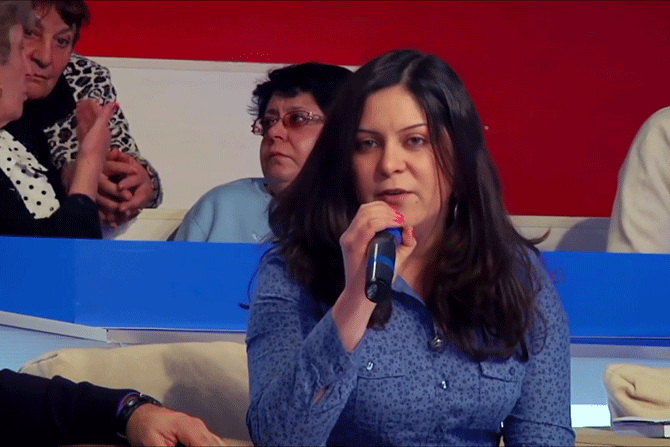
Edgar’s Challenge: Seeking Security as LGBTQ in Armenia
By Melanie Nakashian
The sexual orientation of Edgar Nahapetyan first became a hot topic in his village when he was 18 – the age at which every male in Armenia is required to join the army.
Edgar, like any other openly gay young man, was exempted from service on account of being considered ‘mentally ill.’
Now, the same gossip has made life in his village of Dalarik, located near the Turkish border, into a “literal nightmare” since the 25-year-old’s appearance on Armenia’s most popular talk show, Kisabac Lusamutner (Half-Opened Windows).
Edgar first approached the show in January with the hope that it could raise awareness about his inability to find a job. “Every single LGBT person in Armenia has the same problem,” he said, “because of the biased approach of the employers.”
While homosexuality in Armenia has technically been legal since 2003, there is no law protecting LGBTQ people from any kind of discrimination.
The show did not go as Edgar had expected. Since airing on February 19 of this year, Dalarik has become unbearable for both him and his mother, Goharik. She felt it was necessary to leave her job as a baker and move to her sister’s village – at least “until the situation will calm down.”
“I need to get away from this village in order to save my life,” said Edgar, who continued to live in Daralik until the second week of March when he found a job in Yerevan. His job search was facilitated by PINK Armenia (Public Information and Need of Knowledge), the country’s only NGO focused on LGBTQ rights. He is one of 10 whose job search has been assisted by PINK so far this year, compared to the 20 they helped with the same issue in all of 2015.
Several guest experts were invited to appear in the program, including sexologist Vrezh Shahramanyan, lawyer Garik Galikyan, psychologist Mariam Mehrabyan, artist Sargis Mikayelyan, medical doctor Vardan Hambardzumyan and PINK President Nvard Margaryan.

Psychologist Mariam Mehrabyan and artist Sargis Mikayelyan
Only the latter two were LGBTQ-friendly. PINK Executive Director Mamikon Hovsepyan explained that the other four are recurring guests on Kisabac Lusamutner. “They are there cooperating with the show,” he said. “They are there to make money, to make a spectacle. They don’t care about the guest.”
During the program, psychologist Mehrabyan said that Edgar’s homosexuality could be reversed, claiming she had successfully done so in other cases. Artist Mikayelyan made homophobic jokes and threatened to “break the head of the person who will give [Edgar] a job” because he does not want Edgar walking the same Yerevan streets as his 11-year-old child.
“There was a lot of violation of the law in the show itself,” said Doctor Hambardzumyan.
In particular, Hambardzumyan referred to the following hate speech of lawyer Galikyan: “If there are institutions, organizations that will try to support people like [Edgar], who will try to do propaganda in this country for us to accept [homosexuality], I always, always, and always fought against them, I fight and will fight! Whenever I see them, I will smash them, trample them, and yes – they must be burnt…”

Lawyer Garik Gailkyan
Galikyan’s diatribe was met with applause from the in-studio audience.
PINK President Margaryan noted that Galikyan’s behavior violated the Code of Advocates’ Ethics, which states that lawyers are obligated to defend human rights. PINK, New Humanitarian Generation NGO and the Anti-Discrimination Coalition filed a joint complaint against him to the Chamber of Advocates. But the Chamber’s response skirted the issue, and instead explained why homosexuality is supposedly against Christianity and Armenia’s new Constitution that effectively bans same-sex marriage.
Hambardzumyan also argued that certain comments of his were strategically cut out of the episode that went to air. After sexologist Shahramanyan claimed that homosexuality was a treatable disorder known as ‘ego-dystonic homosexuality,’ Hambardzumyan had responded to explain that this disorder was removed from the Diagnostic and Statistical Manual of Mental Disorders (DSM) nearly three decades ago in 1987.
“This [response] was the most important point,” he said, “and they cut it."
According to Edgar, questions of his intimate sexual relationships were also raised against his will. “We had an agreement. We talked before the show and I said I did not want to talk about my sex life. But they did.” This issue also angered Edgar’s friends and relatives, who otherwise supported his appearance on the show.
Hovsepyan explained that people, especially from villages, are attracted to Kisabac Lusamutner because it provides false hope that their problems will be solved. He described one episode that only made it appear as if a homeless person was being given a home, while another episode brought on a victim of domestic violence as well as her abuser who became violent on air.
Though Edgar’s episode was not the first time Kisabac Lusamutner had invited PINK to their show, it was the first time they accepted because they “knew how Edgar would be victimized,” said Hovsepyan.

PINK President Nvard Margaryan
It will also be the last time they accept such an invite – unless the show accepts PINK’s conditions in return: all guest experts must be chosen by PINK, and the discussion cannot be edited. “If you say something smart, they cut it. They do not want to show their mistakes,” Hovsepyan said. He also described how the show’s security personnel commonly threaten audience members with violence if they dare record with their own devices.
Edgar recounted his initial reasoning for approaching Kisabac Lusamutner, in line with Hovsepyan’s comments: “I decided to let society know about my problem, and I was thinking that maybe it would help me find work.”
He now wishes he could take it all back. “I am regretting a lot,” he said. “I should not have done this.”
While it was already difficult to live in Dalarik prior the show, it got to the point that Edgar felt his safety was in question. “I cannot say for sure that [people in Dalarik] are going to beat me, but after the show, I don’t feel safe there,” he said. “It has become impossible to live there. I imagine now the only solution is to go to the city to live and work.”
Edgar went on several job interviews in Yerevan looking for work as a cleaner, in a hotel, or at a zoo. In his previous interview experiences, potential employers would mock his mannerisms and never call him back. This time, largely thanks to PINK’s assistance, it wasn’t long before he received and accepted an offer as a cleaner at a hotel restaurant.
Edgar described the mentality of a village as being significantly different from that of Yerevan, which he considers to be more tolerant. “I know that there are other gay people in my village, but they are afraid to talk about it. But I’m brave and I don’t want to stay in the closet, because I’m doing nothing wrong. Being gay is not a shameful thing.”
Yet while Edgar may feel safer in the city, Margaryan explained that the mentality towards LGBTQ is not so different in Yerevan compared to the rest of Armenia.
In fact, on February 15, just four days prior to the airing of the episode, five LGBTQ activists were beaten in the streets of central Yerevan by a group of three unidentified people. Two of the victims were PINK staff members. The attackers clearly targeted the group based on physical appearance, cursing with homophobic slurs.
When the primary victim, a transgender woman named Karabina, admitted herself to Yerevan’s N1 Hospital the following day, she faced further discrimination by the hospital’s andrologist who wanted to check her blood for a ‘perversion’ or ‘deviance.’
Several PINK staff members met with officials from the Ministry of Health to discuss the issue on March 10. According to Hovsepyan, the officials seemed surprised by the number of people supporting Karabina. They also responded inconsistently, first saying that the issue was not their concern and then claiming there was no discrimination according to the hospital’s cameras – before knowing that Karabina had also recorded the interaction. A follow-up meeting is scheduled for March 21.
Hovsepyan pointed out that the perceived safety in Yerevan comes not from a difference in mentality, but from the anonymity that comes with a larger environment. “Some people actually prefer to go to Russia because it is bigger, even though they have these terrible laws, such as the propaganda law. In a small place, everybody knows everything and stereotypes are stronger.”
It is unclear whether Edgar will be assured this anonymity in Yerevan, as many people on the street have already recognized him from the show.
The only law addressing general discrimination in Armenia fails to mention either sexual orientation or gender identity. The vaguely written article states that, “everyone, regardless of race, sex, language, belief… are equal before the law.”
Hovsepyan argued that this, as well as the 2013 gender equality law, “do not protect anybody” and exist only “to prove to the EU that we have [such laws].”
The government would never run awareness campaigns about discrimination, he said, thus leaving room for people to be “brainwashed by pro-Russian, misinformation campaigns.” He also noted that though there are some new anti-discrimination initiatives in the works, they rely on the ideals of the Armenian Apostolic Church.
Edgar expressed his desire for a change in the general attitude of Armenians so that those in the LGBTQ community may someday be accepted as “normal” people. “I hope this change will come in the 22nd century, because I don’t believe that something will change in the 21st century in Armenia.”
Top photo: Edgar Nahapetyan and his mother Goharik
(Melanie Nakashian is currently living in Yerevan. She is from New York and has been involved with various international political, media and environmental organizations.)
 Videos
Videos Photos
Photos




Comments (2)
Write a comment